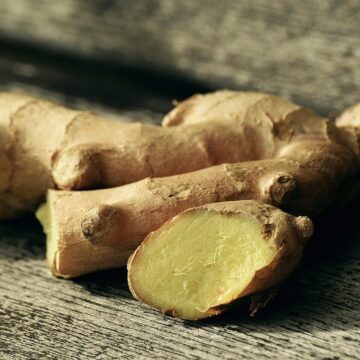
- Ginger has been shown to help ease symptoms of osteoarthritis and rheumatoid arthritis.
- This popular kitchen spice contains the phytochemicals gingerol, shogoal, and zingerone, which can fight inflammation and relieve arthritis symptoms.
- Ginger may be taken in whole-food form or as a dietary supplement in the form of powder, extract, capsule, tea, tincture, or oil.
Benefits for Osteoarthritis

Osteoarthritis (OA) is a condition caused by wear and tear of protective tissue around the joints called cartilage, and commonly affects the joints in the hands, hips, knees, and spine.
The phytochemicals in ginger have anti-inflammatory properties that can relieve pain and swelling caused by OA. A clinical trial found that ginger supplements helped reduce the inflammatory-causing cytokines tumor necrosis factor and interleukin-1-beta in people with knee osteoarthritis.
According to a study published in the Natural Products Research journal, echinacea may boost ginger’s pain-relieving properties.
Ginger may also be applied topically to relieve pain. A small 2017 study found that massaging the knee with ginger oil provides better relief for people with knee OA than plain massage oil.
Benefits for Rheumatoid Arthritis

Rheumatoid arthritis (RA) is an autoimmune disease in which the immune system attacks the joints’ synovial tissue and fluid, causing inflammation and pain. Ginger compounds have been found to provide relief for RA. According to lab studies, ginger extract decreased the inflammatory reactions in synovial cells and may be more potent than ibuprofen in reducing inflammation.
A 2019 clinical trial has shown that ginger reduced the expression of inflammatory-causing genes while raising the expression of anti-inflammatory genes in people with RA.
Further studies found that combining ginger with turmeric may prevent joint damage caused by RA. Animal studies have also found the combo beneficial for the heart, lungs, and kidneys, which are usually affected by rheumatoid diseases.
According to Very Well Health, “ginger can have a therapeutic effect on cyclooxygenase (COX) and nuclear factor kappa-light-chain-enhancer of activated B cells (NFkB)—additional inflammation mediators.”
Dosage and Preparations

Ginger supplements can be taken as a dietary supplement in powder, extract, capsule, tincture, tea, or oil. Divide 2 grams into three doses per day, equivalent to four cups of ginger tea every day.
To use ginger for topical treatment, add two to three drops of ginger essential oil into a tablespoon of a carrier massage oil. Massage oil on the affected area twice a week. You may also add ginger to recipes and consume it in its whole-food form. However, it’s easier to get a consistent therapeutic dose when you take ginger medicinally than when you use it as an ingredient.
Side Effects, Precautions and Warnings

Ginger is generally safe to use as a spice. However, it’s common for some people to experience bloating, gas, heartburn, nausea.
Avoid taking ginger supplements if you have gallstones or are taking blood thinners. Always consult with your doctor before taking any supplements.
Source: Very Well Health
